|
|
|
Sort Order |
|
|
|
Items / Page
|
|
|
|
|
|
|
| Srl | Item |
| 1 |
ID:
093895


|
|
|
|
|
| Publication |
2010.
|
| Summary/Abstract |
Israel's general elections in 2009 yielded three major outcomes: 1) the replacement of the bi-polar system that characterized Israeli electoral politics between 1977 and 2003 in which most parties are aligned to one of the two principal parties by a more flexible multi-party system. 2) The nearly total collapse of the Labor party and the Zionist left; for the first time since the 1920s, the Labor party was no longer a major political player, and 3). Kadima's electoral relative success, despite scandals haunting it since 2006. Kadima has basically superseded Labor without necessarily adopting its ideology. We argue (contrary to Henry Kissinger's quip that Israel never had a foreign policy but only a domestic policy) that primarily external factors and processes - chiefly the failure of the Oslo process in the 1990s - yielded these three outcomes.
|
|
|
|
|
|
|
|
|
|
|
|
|
|
|
|
| 2 |
ID:
128430
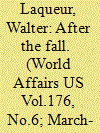

|
|
|
|
|
| Publication |
2014.
|
| Summary/Abstract |
As the Soviet Union disintegrated, ending on the ash heap of history in 1989-91, all the institutes for the study of Marxism-Leninism that had justified the regime, the collected and selected works of the communist classics, and the Marxism chairs in academies and universities also disappeared. From this void emerged a burning question: What was the raison d'être of the existing political system? And later, how did the new regime justify itself in the field of foreign and domestic affairs, and what was its social and economic policy? For the answers, Vladimir Putin and his followers went back to the future. Russia's official ideology prior to 1917 was Pravoslavie, Samoderzhavie,Narodnost, which has been translated as Orthodoxy, Autocracy, Nationality. This statement was made first by Sergei Uvarov, the Russian minister of education, in a circular letter in 1833. Uvarov was a learned man who also served as president of the Russian Academy of Sciences. No one had asked Uvarov to prepare such an official binding declaration. However, Czar Nicholas I liked this "triad," as it was called, even though its meaning was by no means always clear.
|
|
|
|
|
|
|
|
|
|
|
|
|
|
|
|
| 3 |
ID:
135096
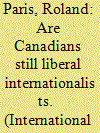

|
|
|
|
|
| Summary/Abstract |
Since coming into office in 2006, the government of Prime Minister Stephen Harper has rejected many of the symbols and practices of the liberal internationalist approach to foreign affairs that Canadian governments of all political stripes broadly embraced during the preceding six decades. As part of this change, the Harper government has also promoted a new narrative about Canada’s history and foreign policy, which encourages Canadians to change how they think about their country and its role in the world. By examining recent opinion surveys, this article asks whether Canadian public attitudes on foreign policy have shifted away from liberal internationalism and toward the Harper government's narrative since 2006.
|
|
|
|
|
|
|
|
|
|
|
|
|
|
|
|
| 4 |
ID:
132412
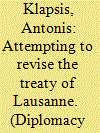

|
|
|
|
|
| Publication |
2014.
|
| Summary/Abstract |
In June 1925, General Theodoros Pangalos imposed his dictatorship on Greece. During his 14-month rule, he set as one of his basic foreign policy goals the revision of the territorial settlement imposed on Greece and Turkey by the 1923 Treaty of Lausanne. Wanting to secure Eastern Thrace and possibly even part of Western Asia Minor for Greece, Pangalos sought the backing of at least one Great Power with interests in the region, in this case Italy, as its dictator, Benito Mussolini, remained equally hostile and aggressive toward Turkey. Pangalos tried to reach an understanding with Mussolini concerning the possibility of joint Greco-Italian action against Turkey. The first signs of closer co-operation came in early July 1925 when the Italian under-secretary of foreign affairs, Dino Grandi, visited Athens for discussions with Pangalos. However, a more important initiative involved the official visit of two Greek ministers-Loukas Kanakaris-Roufos, the foreign minister, and Anastasios Tavoularis, the transport minister-to Rome in early March 1926. They met with Mussolini who, because of British pressure, now seemed reluctant about Pangalos' ambitious plans for joint action against Turkey. The Greek leader's hopes to revise Lausanne ended.
|
|
|
|
|
|
|
|
|
|
|
|
|
|
|
|
| 5 |
ID:
139805
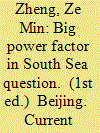

|
|
|
|
|
| Edition |
1st ed.
|
| Publication |
Beijing, Current Affairs Publishing House, 2010.
|
| Description |
246p.pbk
|
| Standard Number |
9787501235773
|
|
|
|
|
|
|
|
|
|
|
|
Copies: C:1/I:0,R:0,Q:0
Circulation
| Accession# | Call# | Current Location | Status | Policy | Location |
| 055962 | 327/ZHE 055962 | Main | Withdrawn | General | |
|
|
|
|
| 6 |
ID:
132032
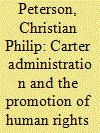

|
|
|
|
|
| Publication |
2014.
|
| Summary/Abstract |
This article will examine the effectiveness of the Carter administration's efforts to promote human rights in the Soviet Union. It will pay particular attention to how human rights promotion fit into a larger approach to transforming Superpower relations in ways favorable to U.S. interests called "reciprocal accommodation [détente]." The use of this framework provides an excellent way to tease out the complexities of how the administration balanced the promotion of human rights in the USSR with other important objectives such as concluding the SALT II treaty. It also helps reveal how executive branch worked to reduce Soviet human rights violations by citing the provisions of the Final Act and working with private citizens to raise international awareness about human rights issues. Without losing sight of his administration's inability to protect Soviet dissenters from arrest and harassment, this article will demonstrate that Carter had every intention of making the issue of human rights an important element of Cold War competition and implementing a new approach to détente that at least in part aimed at transforming Soviet internal behavior.
|
|
|
|
|
|
|
|
|
|
|
|
|
|
|
|
| 7 |
ID:
083437
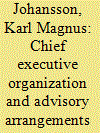

|
|
|
|
|
| Publication |
2008.
|
| Summary/Abstract |
As prime ministers are drawn into international relations and the foreign policy process, they are in need of advisory structures for foreign affairs in their offices. This article examines the system and the role of foreign affairs advisers to the Prime Minister (PM), the chief executive, in Sweden. The article centres on the organization for foreign affairs, in general terms of institutional and staffing arrangements, and on leader-adviser relationships. As the right hand of the PM, inner circle advisers in foreign affairs have a direct role in overseeing foreign policy on the key issues and do more than just serve in an advisory capacity by being operative in diplomacy and in policy coordination. These advisers can therefore wield influence on policy and the government based on their own expertise and position at the centre of power and at the frontier between the chief executive and the outside world
|
|
|
|
|
|
|
|
|
|
|
|
|
|
|
|
| 8 |
ID:
154435
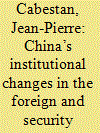

|
|
|
|
|
| Summary/Abstract |
This article focuses on the institutional changes that have occurred in the foreign and security policy realm since Xi Jinping became General Secretary of the Chinese Communist Party (CCP) in November 2012. The establishment of a National Security Commission (NSC) in November 2013, the power centralization in the Central Military Commission (CMC) and the reorganization of the CCP leadership of the People’s Liberation Army (PLA) as well as the major branches of the PLA, the reorganization in March 2013 of the various civilian maritime security agencies and the establishment in December 2013 of a Cybersecurity and Informatization Leading Small Group (LSG) are the most striking organizational reforms introduced by Xi. But other institutional changes have taken place as Xi’s inclination to rely on a larger number of actors and in particular to give his closer political allies a bigger role also in foreign and security policy. These changes have obviously helped concentrate more power in the hands of Xi Jinping and, to some extent, better coordinate domestic and external security objectives and on the whole have well served China’s foreign and security policy’s assertiveness and initiatives. However, these changes have only partly reduced the power fragmentation that has developed extensively under Hu Jintao, and they have not contributed to institutionalizing decision-making processes at the top of the CCP and the state apparatuses. On the contrary, it appears that through these changes Xi has not only created new bureaucratic overlaps and tensions but also, in relying more on his own advisers, fed frustrations and competitions among agencies and officials, in other words, new forms of power fragmentation.
|
|
|
|
|
|
|
|
|
|
|
|
|
|
|
|
| 9 |
ID:
193138
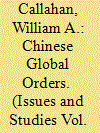

|
|
|
|
|
| Summary/Abstract |
While many use rational IR theory to explain Chinese foreign policy behavior, this paper follows global IR to employ interpretivist theory to examine how Chinese elites understand their country’s role in the world. In particular, it explores the Chinese global order ideas of socialism, tradition, and nation through a comparative analysis of how they work in China–Russia relations, especially after China’s 20th Communist Party Congress in 2022. The first section presents a critical analysis of the realist understanding of the China–Russia–U.S. strategic triangle. It argues that the socialist concept of “united front work” better explains Chinese (and Russian) policy in terms of short-term “tactical triangles.” To probe China’s long-term global order ideas, the second section explores narratives of tradition to examine the concentric circles model of global order seen in Chinese tianxia and Russian Eurasianism. To understand these competing Russocentric and Sinocentric global orders, the third section explores how each country’s official historiography highlights narratives of the nation and especially how national rejuvenation requires correcting the “national humiliation” of lost territories. Rather than see these narratives in a linear chronological history — i.e., from tradition to socialism to nationalism — this paper considers how they overlap in socialism, tradition, and nation, a non-linear dynamic triad of global order ideas. It concludes first that further research is necessary to examine the interrelation of these three narratives: while nation and tradition are often employed to support the overarching narrative of socialism in recent years, this could certainly change. The conclusion then argues that while these narratives may be coherent theoretically, they have not been very successful in achieving Beijing and Moscow’s foreign policy objectives.
|
|
|
|
|
|
|
|
|
|
|
|
|
|
|
|
| 10 |
ID:
083991
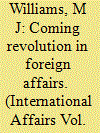

|
|
|
|
|
| Publication |
2008.
|
| Summary/Abstract |
For the last two decades the US has pursued what some analysts have called the 'fantastical idea' of military transformation that would enable the US to change the very nature of war. Known as the 'revolution in military affairs', this process would use technology to provide the US with battlefield dominance that no opponent could overcome. Motivated by the politics of the Cold War, however, this exit from reality has proved less than effective in what has become known as the 'war on terror'. The US has been pulled into nasty, 'small' wars, against enemies utilizing asymmetric tactics. The Bush administration has tried to destroy these groups through the use of military force, failing, or even worse refusing, to recognize that these enemies feed off the economical, political and social rot of weak and failing states. For the last eight years the US government has addressed the symptoms of a problem rather than the actual disease. If America wants to make serious progress with the most pressing national security risks, the next American president must enact a revolution in foreign affairs that sees a massive overhaul and substantial investment in the State Department and USAID. A critical mass of research exists to illustrate the links between development and security-it is time Washington gets serious and embraces a conception of security that is more holistic, and ultimately, more effective.
|
|
|
|
|
|
|
|
|
|
|
|
|
|
|
|
| 11 |
ID:
129784
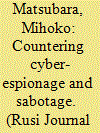

|
|
|
|
|
| Publication |
2014.
|
| Summary/Abstract |
Cyber-security is an increasing concern for both the UK and Japan, which have recently begun to co-operate more closely in this field as part of wider efforts to revitalise bilateral ties in foreign and security affairs. Mihoko Matsubara looks at this emerging partnership and explores the benefits and drawbacks of potential future joint initiatives, suggesting how the two countries can work together to mutual benefit.
|
|
|
|
|
|
|
|
|
|
|
|
|
|
|
|
| 12 |
ID:
128199
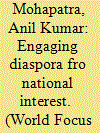

|
|
|
|
|
| Publication |
2014.
|
| Summary/Abstract |
The growing influence of diasporas on foreign affairs and the international behavior of the states has been a worldwide academic finding and a reported fact. As independent actors they have operated as lobbies which have actively influenced homeland (ancestral or kin-states) foreign policies and that of the host lands as well (Shain et al 2003). Especially the developing countries in their mission of development have tried to rope in their communities abroad in the process. This global phenomenon of diaspora-homeland linkage has debate on economic and political systems, national culture and international relations.
|
|
|
|
|
|
|
|
|
|
|
|
|
|
|
|
| 13 |
ID:
132930
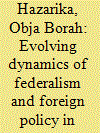

|
|
|
|
|
| Publication |
2014.
|
| Summary/Abstract |
Although, the central government in India has been constitutionally empowered to decide on foreign affairs, this article has attempted to portray that sub-national units have influenced and affected external engagements to a certain extent. The central government as well as foreign audiences have acknowledged the role of the states of India in external engagements and have often included them in discussions and negotiations relating to foreign affairs. Sub-national diplomacy has taken varied manifestations in India. First, states have embarked on economic diplomacy with foreign audiences. Secondly, states sharing an international border have influenced neighbourhood policy and thirdly, regional parties, which have served as coalition partners at the centre have often leveraged their status to exert pressure on the centre in certain foreign policy decisions. The centre, being the final authority on external affairs in India, must continue to conduct foreign policy with an aim to secure the national interest of the country as well as to ensure that the legitimate interests and concerns of the states are adequately accommodated.
|
|
|
|
|
|
|
|
|
|
|
|
|
|
|
|
| 14 |
ID:
098274
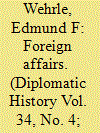

|
|
|
| 15 |
ID:
141964
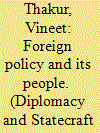

|
|
|
|
|
| Summary/Abstract |
Just as apartheid was ending, South Africa’s foreign relations witnessed a massive expansion. However, the Department of Foreign Affairs that was to manage this change found itself undergoing institutional transformations of both personnel and ideology. Studies on South African foreign policy have mostly neglected this transformation, which has had a considerable influence on the content and direction of South African foreign policy. In discussing this seldom-studied issue, this analysis unearths the discussions and debates that took place between various stakeholders to bring about transformation in the Department. In doing so, it argues that two different cultures of diplomacy came together in forming the new Department of Foreign Affairs. These cultures have had a significant impact on the thrust and direction of post-apartheid South Africa foreign policy.
|
|
|
|
|
|
|
|
|
|
|
|
|
|
|
|
| 16 |
ID:
108922
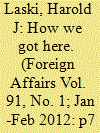

|
|
|
| 17 |
ID:
127014


|
|
|
|
|
| Publication |
2013.
|
| Summary/Abstract |
Diplomats are grappling today with a host of problems in a globalized world: countries are becoming increasingly linked; national boundaries have grown more porous; and borders between internal and external processes are disappearing. The foreign affairs of any country do not stand by themselves anymore, diplomats can no longer be guided exclusively by large-scale geopolitical plans or constructs. The development of any one country and the logic of how its central government is built hinges on the surrounding situation in the same way that the global situation depends on the decisions taken by large - and not so large - countries. And, of course, foreign policy professionals cannot be indifferent to events happening within their countries and to whether these events befit the international context or stand at odds with it.
|
|
|
|
|
|
|
|
|
|
|
|
|
|
|
|
| 18 |
ID:
133910
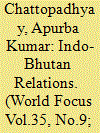

|
|
|
|
|
| Publication |
2014.
|
| Summary/Abstract |
Since independence of India the new government at the Centre headed by Jawaharlal Nehru had adopted a very effective foreign policy and by virtue of which the bilateral relations between the subcontinent of India and the Himalayan kingdom of Bhutan have been emerged as traditional friends with each other. Since then India remains influential and plays the role of a big brother of its neighboring countries- Nepal, Bangladesh, Srilanka, Pakistan, Myanmar, Mauritius and Bhutan in particular. As a matter of fact Bhutan's defence, commerce and foreign affairs has been greatly influenced by India.
|
|
|
|
|
|
|
|
|
|
|
|
|
|
|
|
| 19 |
ID:
125320
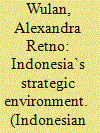

|
|
|
|
|
| Publication |
2013.
|
| Summary/Abstract |
Dynamic of international relations in the third quarter of 2013 showcase two traditional patterns between competition and cooperation. This article depicts several events within the scope of international relations during the period of June-September 2013. Such event evidently illustrate Indonesia`s Strategic environment, in the regional and international level, still corresponds to the patterns of competition which can lead to conflict, and patterns of cooperation that can build peace.
|
|
|
|
|
|
|
|
|
|
|
|
|
|
|
|
| 20 |
ID:
111172
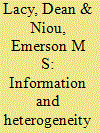

|
|
|
|
|
| Publication |
2012.
|
| Summary/Abstract |
A voter's capacity to acquire and retain information moderates the relationship between issues and the vote. Issues differ in their distance from the voter's personal experience. Proximate issues, such as personal economic conditions, affect the vote decisions of highly informed and less informed voters equally. Distant issues, such as national economic conditions and foreign affairs, affect the vote of highly informed voters but not less informed voters. The 2008 presidential election on Taiwan provides a critical test of the effect of information on issue voting. Unification with mainland China versus Taiwan independence is the most important issue in the 2008 election, and voters with higher levels of political information show a larger effect of the issue on their vote. The national economy is also a significant predictor of vote choice, but only for highly informed voters. Personal economic conditions and other proximate issues are not significant predictors of the vote at any information level.
|
|
|
|
|
|
|
|
|
|
|
|
|
|
|
|
|
|
|
|
|